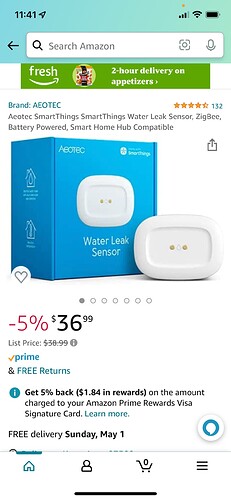I'm looking to purchase 8 leak sensors and looking for a reliable device with decent battery life in the $25-30 range. The one I keep coming back to is the Centralite 3315-C. Are there better options I should be considering? What's everyone's go-to device?
These are awesome and work well with @kkossev's driver.
Both of these zigbee sensors work with built-in drivers:
https://www.amazon.com/THIRDREALITY-Detection-Notifications-Compatible-SmartThings/dp/B09MVKNNNQ/
My current favorite is the Centralite Zigbee, very similar to the now unicorn SmartThings zigbee leak sensor.
Aeotec makes the current version of the original SmartThings leak sensor but it is quite expensive compared to Centralite, and the Centralite is an excellent device.
Whew with that many I'd suggest trying that Tuya for a bit, do some testing. If it works order the other 7 from China eBay, aliexpress, etc.
I fortunately bought several of the SmartThings sensors before they changed to double the price from Aeotec. They work perfectly, but do sit in the water, which can be a pain. I have an Ecolink z-wave sensor in my crawl space that’s worked well for over a year now. It can be mounted in a more convenient location since it has a 4 foot extension.
Are these SmartThings Leak sensors still available in the US at this price?
It is a great leak sensor, came with my ST hub and still working flawlessly!
Hmm, $44 for a four pack of the Linkind sensor makes it worth a try. And as a bonus they take 2 AAA batteries. Are you using these?
Surprisingly, these are available also on Amazon.de at the same price!
https://www.amazon.de/dp/B08RGD1W4W?ref_=cm_sw_r_cp_ud_dp_V3KZYR29WX4B9PEDY9YD
that's a good deal. My linkind plugs work well, their buttons don't and I don't think they ever can. Personally I'm over them.
I am and they appear to be working great.. I have about 6 of them in operation right now - it's been a month or so. They are a bit large but come with a built-in alarm which is nice. Am using the Generic Zigbee Moisture Sensor (no temperature) driver.
They are $36 on Amazon, $28 is a good price if they are authentic.
If I was buying more leak sensors I would go w/the Aeotec, based on proven design, and have found the SmartThings leak sensors (which they are based on) to be 100% reliable over the years. Some devices you can focus more on price, but for leak sensors you want rock-solid dependable.
I have tested one a few months ago. It was detected as a contact sensor, but I changed the driver to "Generic Zigbee Moisture Sensor", and clicked configure. It reported wet/dry perfectly.
As an aside, also works well with zigbee2mqtt.
And you get as a bonus at the same time with SmartThings leak sensor a rather precise temperature sensor ... Usually 1-2 degrees lower than the temperature measured 2 meters above the floor.
I will offer my own thoughts, take them if you wish. None of these sensors should be trusted explicitly. You need to test them regularly by placing them on a damp paper towel to see if they react as expected. If they don't because they have dropped off the network, but their battery isn't dead, then I give them one more chance and check them on an even more frequent basis to see if it was just a fluke occurrence.
If they report every time I test them (not considering dead batteries which would effect any device), then I deem that worthy of protecting our home. To this end, I have 2 Xiaomi leak sensors, 2 LeakSmart leak sensors, 1 Centralite leak sensor, and 1 Insteon leak sensor. All work perfectly every time I test them (as long as their batteries are good).
In regard to the batteries, I don't trust reporting in the drivers. That tends to be all over the map and highly inaccurate. I remove the batteries every few months and test them with an MBT-1 tester. I also have Flo by Moen, so I'm about as covered for leaks as one can be.
Agree...I really don't treat anything on my hub as if I expect it to be perfect.  That's why I don't do any "home security" stuff with it, and why, as you note, testing is key to confirming continuing device function/reliability.
That's why I don't do any "home security" stuff with it, and why, as you note, testing is key to confirming continuing device function/reliability.
My point was that in general you can reduce your risk of running into HW issues by getting known, reliable devices that you or others have extensive experience with. Since (for me) leaks are the most important event that I'm monitoring in my house, I would not focus on price when buying leak sensors. That's why all of mine are Samsung and Centralite, both known and trusted devices/manufacturers for me. 
The SmartThings sensors have always reported battery level well for me. Once they’re below 50% I change them.
I'm a fan of the Linkind sensors. We have 12 in use currently, both on ST and HE. None have fallen off the network.
Not needing specialty batteries is a huge plus. Huge. Battery reporting is pretty accurate.
The Tuya TS0207 based sensors (sold under different names) are good as well.
We have 1 of the 2nd generation SmartThings sensors and it has been solid. Battery reporting is accurate.
I agree that buying leak sensors solely on price is kind of like searching for a bargain heart surgeon but the prospect of shelling out $300 or more in one shot is a painful. The Linkind sensors are better than what I have now (nothing) and allow me to shop around for good pricing on other sensors. Who knows, I might even keep the Linkind sensor in place and add another Centralite/Aeotec. etc, next to it for belt and suspenders protection.



